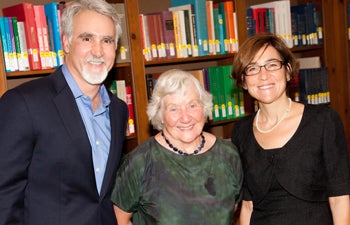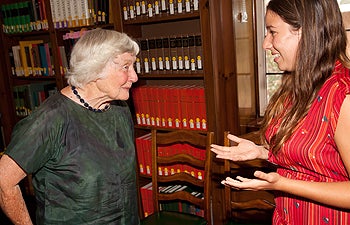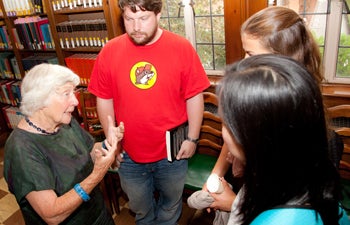Bold as Ever
Baroness Shirley Williams of Crosby believes a constant lackadaisical voter turnout is responsible for the dearth of governmental policy changes that would improve the quality of life in key areas such as health care and the environment in the United States.
“In the next presidential election it will be remarkable if 50 percent of the electorate actually vote,” the British politician and academic told students and professors during her talk on Sept. 5 at Doheny Memorial Library. “This has two great characteristics. Those not voting are overwhelmingly young. People under 40 don’t vote in the United States unless they are highly educated like you.”
Elected to British Parliament in 1964, Williams was one of the “Gang of Four” who declared that the Labour Party had been taken over by their party’s left-wing members and in 1981 founded and became president of the United Kingdom’s Social Democratic Party. She served from 1981 to 1988, and later led the Liberal Democrats in the House of Lords, serving from 2001 to 2004.
Recently honored as the Emory Bogardus Distinguished Lecturer in the Social Sciences in USC Dornsife, Williams’ talk was part of a wider visit to the university, which also included several classroom lectures, luncheons, dinners and chats with students and professors at teas.

Baroness Shirley Williams (center) stands with Robert English, associate professor and director of USC Dornsife’s School of International Relations; and Alison Renteln, professor of political science and anthropology in USC Dornsife with a joint appointment at the USC Sol Price School of Public Policy, who helped organize the visit.
During her lecture, Williams lamented that people under age 40 uneducated beyond high school vote at very low numbers.
“As well as the young don’t vote, the poor don’t vote,” she continued. “What that means is the vote is extraordinarily dominated by the old and the reasonably wealthy.”
The skewed vote is one reason that issues such as Medicare are so heatedly debated, she said.
“These are policies that echo with and reverberate with the upper-middle class and rich,” she said.
Crucial environmental issues such as climate change would be brought to the forefront if more young people were involved in the discussion, she said.
“The reason why the United States is grappling with issues like massive environmental change compared to countries where the young vote is because the young are much more aware of the possible complexities of environmental change,” she said.
Williams’ visit was organized by Alexander M. Capron, University Professor and Vice Dean at the USC Gould School of Law; Robert English, associate professor and director of USC Dornsife’s School of International Relations; and Alison Renteln, professor of political science and anthropology in USC Dornsife with a joint appointment at the USC Sol Price School of Public Policy.
Williams, an expert on international political policy, was an adviser to former prime minister Gordon Brown of the Labour Party (2007-2010), on issues of nuclear proliferation. During her lecture, Williams voiced concern about threats to declare war on Iran if the country develops a nuclear program.
“I’m frankly frightened about the growing assumptions in both [the Democratic and Republican] parties that there will be a military strike on Iran,” Williams said. “This complex state is one that is also scared by the fact that it’s surrounded by natural enemies. Natural enemies that are either native members like Turkey or Sunni countries like Saudi Arabia. It lives at great risk.
“If you accept that the United States, Russia, Britain, France and China should all have nuclear weapons because they have legitimate reasons to fear attack, you should have to at least think about putting yourself in the position of Iran and asking yourself if you might think that you, too, were at risk of attack.”

America Hernandez — a junior with a double major in political science in USC Dornsife and journalism in the USC Annenberg School for Communication and Journalism — chats with Baroness Shirley Williams. Photo by Mikel Healey.
She questioned why the U.S. has quelled communication with Iran.
“What I do feel incredibly sad about is that there has been a total failure of communication between the United States and Iran since 1980,” she said, adding that she understood why President Jimmy Carter broke off diplomatic relations after the Iran hostage crisis and the Islamic Revolution.
“But that was 1980,” she said. “I don’t understand why the United States didn’t re-create diplomatic relations in one of the most important countries in the Middle East. At least to find out whether there is room for discussion or negotiation, etc. As a result attitudes on both sides have soured and there’s very little room now for discussion.”
She reminded the audience of the Iran-Iraq War that lasted from 1980 to 1988, when Iraq invaded Iran following a longtime border dispute.
“Almost nobody here knows Iran had a war with Iraq back in the 1980s in which more people died than in the First World War in the U.K. and France. About a quarter of the young population were killed, seriously mutilated or beaten, but nobody ever talks about that,” she said. “Nobody ever talks about the fact that the United States and the United Kingdom provided the arms for Iraq. Iran did not provoke the invasion it was entirely provoked by Saddam Hussein. And yet we never express any understanding of the effects of that.”
After the lecture, English said Williams’ discussion of health care and gun violence resonated with him.
“We have an awful epidemic of gun violence, yet shrink from even the simplest common-sense measures to limit it,” English said. “We are the only civilized country in the world without a guarantee of health insurance, and when a Democratic president tries a Republican authored, market based plan, those same Republicans suddenly denounce it. And, in both of these examples, to the detriment of U.S. society.”
Renteln said Williams was eager to meet students and faculty from various schools and wide-ranging disciplines.
“Mrs. Williams is one of the major figures in international politics of our time,” Renteln said. “She’s a wonderful role model for our students, especially for young women, and this was a fantastic opportunity for them to meet an important public intellectual of her stature. She was truly inspiring.”
America Hernandez — a junior with a double major in political science in USC Dornsife and journalism in the USC Annenberg School for Communication and Journalism — said she appreciated Williams’ candor.
“She was willing to make very bold statements on political issues,” Hernandez said. “Her boldest comment went against the position that we shouldn’t allow Iran to have nuclear power.
“In the U.S. this is a hot-button issue,” she continued. “[Williams] was willing to say, ‘Look at the history that no one wants to talk about,’ ” she said. “ ‘Look at it from this country’s perspective.’ ”

Simon Radford, a USC Dornsife Ph.D. student in political science and international relations (center), joins a conversation with Baroness Shirley Williams and two other students. Photo by Mikel Healey.
Simon Radford, a USC Dornsife Ph.D. student in political science and international relations (POIR), was amazed that such a high-ranking official made herself so accessible to students.
A dual U.S. and U.K. citizen, Radford once ran for a seat on the Parliament coming in third. He agreed with Williams that the U.S. should impose a limit on how much a presidential candidate can spend on a campaign.
“This year, there’s a good chance we’ll see the first billion dollar campaign and I think there’s two of them,” Radford said. “And if you think there are billionaires who can just drop a check for $100 million for a campaign, it makes you wonder what’s the point in getting involved yourself when you’re so outgunned.”
The Emory S. Bogardus Distinguished Lectureship is named for the founder of USC Dornsife’s Department of Sociology. At that time in 1915, only about 100 colleges and universities in the U.S. offered sociology courses. Bogardus wrote foundational works in the fields of social psychology, public opinion, politics and social theory, focusing on immigration, race and ethnicity. This set the stage for the department’s continuing focus on the study of social inequality and immigration, nearly a century later.